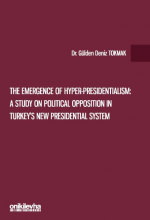 In 2017, Turkey underwent a dramatic shift in its political setting with the introduction of a new presidential system, significantly altering the checks and balances between the executive and legislature. This book offers a critical examination of Turkey's 2017 constitutional amendments, focusing on the political opposition. By exploring hyper-presidentialism and drawing on comparisons with presidential systems in Latin America and the United States, this work offers insights into the challenges faced by political opposition. It explores the challenges faced by both parliamentary opposition and civil dissent in a hyper-presidential system, analyzing how the concentration of presidential power complicates efforts to oversee the executive. This book is a resource for scholars, policymakers and anyone interested in the relationship between executive and opposition in Turkey's evolving political system, as well as the broader implications of hyper-presidentialism globally.(ARKA KAPAKTAN)
In 2017, Turkey underwent a dramatic shift in its political setting with the introduction of a new presidential system, significantly altering the checks and balances between the executive and legislature. This book offers a critical examination of Turkey's 2017 constitutional amendments, focusing on the political opposition. By exploring hyper-presidentialism and drawing on comparisons with presidential systems in Latin America and the United States, this work offers insights into the challenges faced by political opposition. It explores the challenges faced by both parliamentary opposition and civil dissent in a hyper-presidential system, analyzing how the concentration of presidential power complicates efforts to oversee the executive. This book is a resource for scholars, policymakers and anyone interested in the relationship between executive and opposition in Turkey's evolving political system, as well as the broader implications of hyper-presidentialism globally.(ARKA KAPAKTAN)
TABLE OF CONTENTS
CHAPTER 1
1. THEORETICAL FOUNDATIONS AND POLITICAL CONTEXT OF HYPER-PRESIDENTIALISM IN TURKEY
1.1. Understanding Presidentialism and Hyper-Presidentialism
1.1.1. Definition and Characteristics of Presidentialism
1.1.2. Evolution to Hyper-Presidentialism
1.2. Theoretical Framework
1.3. Debating a Presidential System in Turkey
1.3.1. Political Environment Before the Referendum
1.3.2. Referendum Campaign
1.3.3. Referendum or Plebiscite?
1.4. The Constitutional Amendment of 2017
1.5. Conclusion
CHAPTER 2
2. PARLIAMENTARY OPPOSITION
2.1. Contributing Factors to Ensure Parliamentary Majority
2.1.1. Electoral Legislation
2.1.2. Political Party System
2.1.3. Abuse of State Resources and Media During the Election Periods
2.2. Information and Oversight Mechanisms
2.2.1. General Debate and Parliamentary Inquiry
2.2.2. Written Questions
2.2.3. Parliamentary Investigation
2.2.4. Budget
2.2.5. Constitutional Review of Laws and Other Acts of Parliament
2.3. The Effects of Presidential Powers on Legislative Branch
2.3.1. Presidential Power to Legislate
2.3.2. Withdrawal from International Agreements
2.3.3. Power to Veto
2.3.4. Presidential Power to Appoint
2.3.5. Presidential Power to Judicial Appointments
2.3.6. Dismissal of the Legislature
2.4. Judicial Harassment Practices on Parliamentary Opposition
2.4.1. Lifting Parliamentary Immunity
2.4.2. Dissolution of Political Parties
2.4.3. Challenges Faced by Opposition Mayors
CHAPTER 3
3. CIVIL DISSENT
3.1. Legal Regulations to Challenge Civil Dissent
3.1.1. Permanent State of Emergency
3.1.2. Challenges on Civil Society
3.1.3. Censorship
3.2. Policies to Affecting Dissent
3.2.1. Challenges on Press
3.2.2. Challenges to the Academic Freedom
3.2.3. Challenges to Legal Practice
CONCLUSION
BIBLIOGRAPHY
